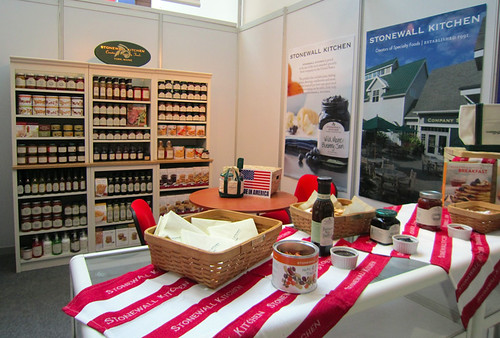
When the astronauts aboard the International Space Station received a shipment of food recently, it included jam from a company called Stonewall Kitchen. Jonathan King and Jim Stott started selling their homemade jams from a folding table at a local farmers’ market in Maine in 1991. Today, their company sells specialty food products that are enjoyed all over the world, literally.
Stonewall Kitchen participates in the Food Export USA – Northeast Branded Program, which is funded by the Foreign Agricultural Service’s Market Access Program. MAP helps U.S. producers, exporters and trade organizations finance promotional activities for U.S. agricultural products. Over the years, the financial assistance from the program has helped this small business successfully export its jams, condiments, sauces and baking mixes to more than 40 countries across Europe, the Middle East, Central America and Southeast Asia.
“We initially began exporting to neighboring Canada, whose proximity and similar food culture allowed us to test the export waters,” said Carol Deeney, Stonewall Kitchen’s international sales manager. “Slowly, we began shipping to retailers overseas that had come across our brand here in the United States and were intrigued by the quality and flavor of our products.”
Eventually Stonewall Kitchen started participating in USDA-endorsed trade shows to increase its international exposure. Participating in international trade shows can be costly, Deeney said, but MAP defrays some of the costs.
“Up to 50 percent of eligible trade show expenses can be recovered via MAP and other state-sponsored programs,” she said. “Exhibiting at an international trade show positions your company in the market you researched and selected for your brand. It’s a great way to not only attract new buyers but to meet with current customers in person.”
Deeney said deciding to export requires a well-organized plan, resources, time and a commitment to developing a company’s brand in foreign markets. Having a well-developed and nationally-awarded brand in the United States has given Stonewall credibility and has been pivotal to the company entering new markets.
Increasing export opportunities for small- and medium-sized agribusinesses like Stonewall Kitchen is one of FAS’ top priorities. In doing so, FAS is helping achieve President Obama’s National Export Initiative objective of doubling all U.S. exports by the end of 2014. For more information about FAS market development programs or a list of trade events, visit www.fas.usda.gov.




